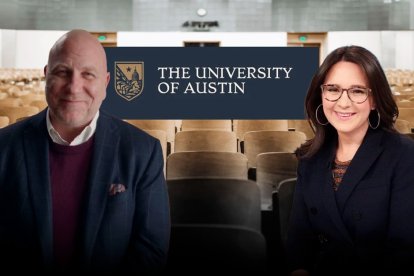University of Austin, a pillar of freedom amid the drift of academia
It began as a dream in 2021 and was developed as an alternative to traditional education. Today, the UATX concept stands as a forward-thinking model for the future, especially as conventional universities face increasing discredit.

University of Austin. VOZ
Political correctness, the mother of the woke culture, has provoked a spiral of censorship in the prestigious academic world in the United States. Elite universities have lost the respect they once had from most Americans.
And it's not just a fact recognized by the conservative world. Earlier this year, renowned CNN commentator Fareed Zakaria discussed the growing discredit of elite universities and their declining popularity among the public. A Gallup poll revealed that from 2013 to 2019, approval of universities dropped from 73% to 41%.
A much more alarming poll is that of the Pew Research Center from 2018 which found that 61% of Americans then considered that prestigious universities were going in the wrong direction.
Regarding Americans applying to colleges, the number dropped from 70% in 2017 to 62% in 2023, according to an article in the New York Times.
The reasons are simple: cancellation culture has inhibited debate. The ideological and identity-focused obsession of universities has caused them to no longer be friendly spaces for all thoughts and communities. As Fareed Zakaria said, "good intentions have been transformed into dogmatic ideology and have turned universities into places of perverse political objectives and not of academic merit."
It is precisely in the midst of this context that in 2021 a group of billionaires decided to finance an initiative with the purpose of offering a new path to students who aspire to be educated in an environment where they can debate and contrast ideas, without fear of being persecuted.
The University of Austin (UATX) used to be just a dream. Today it is a reality, with more than a hundred students, a growing campus and an important projection. Unsurprisingly, it has stirred the academic world, and despite facing challenges, it is likely to inspire a shift away from prevailing criticisms and toward a renewed commitment to free debate.
Founded for debate
It was founded in May 2021 when Joe Lonsdale, the founding investor of companies such as Palantir Technologies and OpenGov; Pano Kanelos, then-president of St. John's College; academic Niall Ferguson and journalist Bari Weiss met in Austin, Texas, to discuss how to respond to the drama facing the university world.
A few months later, in November 2021, the concept was made public. Immediately thousands of potential students, parents and faculty knocked on its doors. They were interested in the idea.
In an interview with the Wall Street Journal, Pano Kanelos, the university’s current president, said the motivation behind the UATX was the need to promote opens and civil debate, something he believes has been dismantled in traditional universities due to intolerance.
A generous endorsement
Joe Lonsdale wasn’t the only one to use his own money to fund the project. Trader and school voucher advocate Jeff Yass donated $35 million.
Another big backer was real estate billionaire and well-known Republican donor, Harlan Crow. Crow told the Wall Street Journal that "much of higher education today seems to want to reject Western achievements and the achievements of Western civilizations as a whole."
Crow is all in. He has even lent his Dallas mansion to the university for events. He allowed AUTX to use space in an office center of his for a summer program, provocatively called 'Forbidden Courses.'
Warner Music Group's billionaire owner, Len Blavatnik, also helped to fund the university.
So far, according to the Wall Street Journal, the university has raised about $200 million, which is "a large sum for such a small school with no alumni to draw upon."
This level of funding has enabled the university to offer full scholarships to its first 100 students, who will soon get started. For these students, the university will not only be a place to study but a space where they can actively contribute to the creation of the university’s culture, according to an article in The Texas Tribune announcing that applications are now open.
A heterodox approach
The University of Austin does not set out to have a conservative approach at all. The idea is that all points of view can meet in a space of total freedom. Kanelos explains that the intention is to restore an academic culture that has been eroded "by ideological conformism."
In the 'Forbidden Courses' program, for example, UATX gives students the chance to discuss topics that, at other universities, are often censored or limited. Subjects such as "Science and Christianity" and "The Psychology of Morality" encourage respectful debate and diverse viewpoints.
Another purpose of the UATX is to counter the "intellectual asymmetry" that Kanelos finds in general and that, according to him, created an atmosphere of fear among those who are not particularly progressive. However, Kanelos rejects the idea that the university is perceived as "a love fest among the right wing."
"I have no interest in an anti-woke university (...) When we build this institution, there will be people of all intellectual persuasions or we will have failed," Kanelos told the Wall Street Journal in January 2022.
A promising future
If there is one thing the University of Austin has already accomplished that others would envy, it is that there is already a large and diverse community of interested scholars, students and donors. Given the press, recognition and attention, the University of Austin succeeded in positioning itself as the leading alternative in an academic environment utterly dominated by one ideological current.
The vision of Kanelos, Bari Weiss, Niall Ferguson and their colleagues is ambitious. They want to build a proper campus in Austin and continue to expand its academic offerings while maintaining a focus on intellectual freedom.
It is clear that those who founded the university did so not as a response to the current crisis but to create a model for the future.
Today the University of Austin is housed in the historic Scarbrough Building in downtown Austin. The space is temporary. Construction of the larger campus, on the outskirts of the city, is already underway.
The challenge is enormous but given the perception of most Americans, based on surveys, the context is favorable.
"Universities have a responsibility to actively participate in creating a culture of civil discourse," Kanelos told the WSJ.
"If we don't cultivate citizens who can talk productively across differences and help each other move forward, we will have shirked our responsibility as educators. How do we create those bonds of trust? How do we change things for the better? That's the contribution I'd like to make," he added.
RECOMMENDATION





















